How Much Are Replacement Windows?
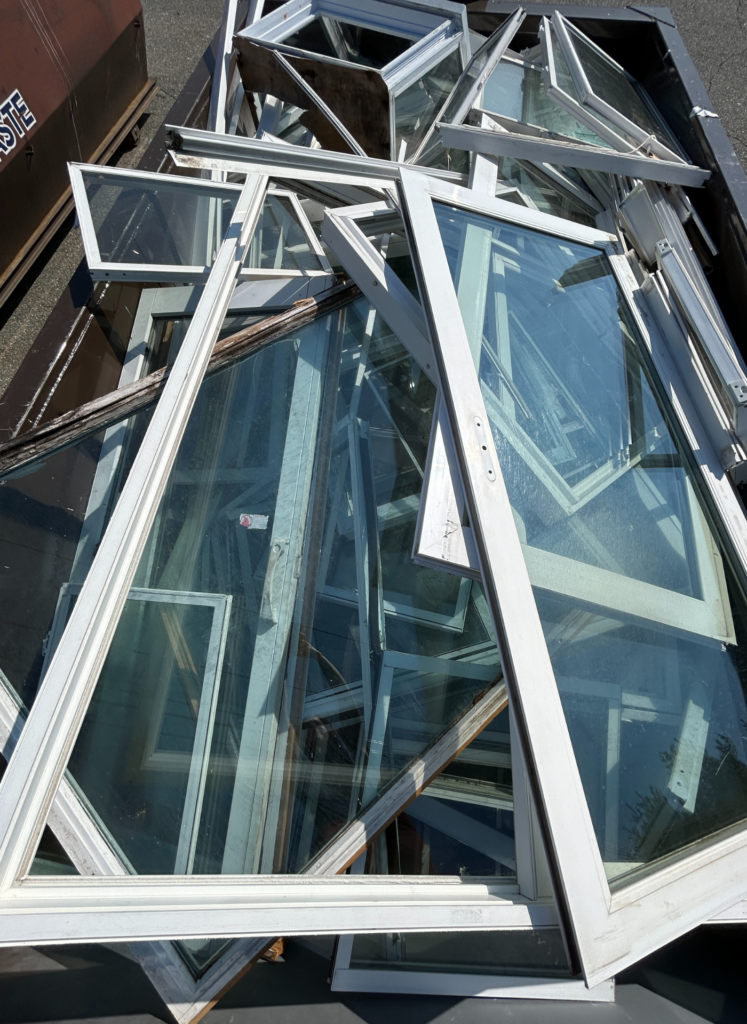
Replacing windows in your home is a significant investment that pays for itself in a serious way. Updating your home’s windows can improve curb appeal, increases resale value, and can make your home more energy-efficient. So, you must be wondering, how much are replacement windows? The cost of new windows vary significantly based on several factors including the type of window, material, energy efficiency options, and installation complexity.
That’s why we made a comprehensive guide to understanding the costs associated with window replacement.
Key Takeaways
- Window replacement costs vary based on materials, window type, size, and the number of windows
- Energy-efficient windows may come with a higher upfront cost but offer long-term savings
- Additional costs like permits, labor, and disposal fees should be considered when solidifying your budget
Average Window Replacement Cost Scale
On average, homeowners spend between $1,000 to $3,500 per installed window, depending on the type and quality of the window.
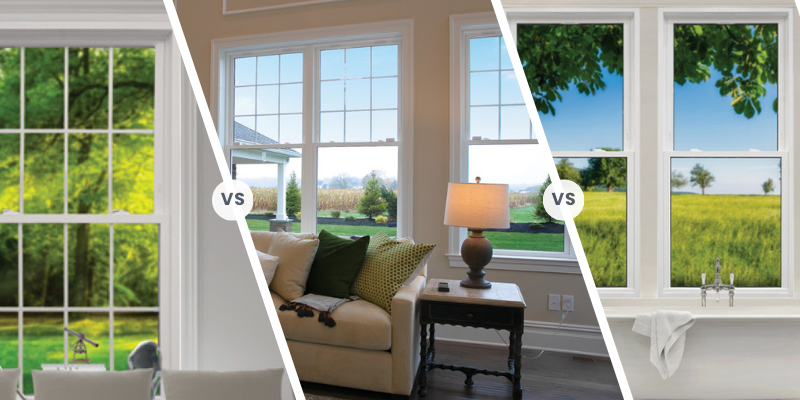
Window replacement costs vary greatly based on the style, size, materials, features, and customizations.
Although the average cost per window varies significantly, window upgrades have a high return on investment (ROI), not only by increasing your home’s value but also by reducing your monthly energy bills.
How much are replacement windows? Here’s a breakdown of typical price ranges:
Prices can vary for basic windows, homeowners can expect approximately $800 to $1,200 per installed window. These windows are relatively standard for the marketplace, made with recycled vinyl, metal spacers and materials with a lower price point. There are pros and cons to windows in this category, with upfront cost being a major benefit but energy-efficiency as an issue as their ratings do not compare to those within the next two categories. Depending on the amount of glass panes, coatings, and personal selections, homeowners can expect to pay approximately $1,800 to $2,200 per installed window for mid-tier windows. These windows offer better energy efficiency and durability than basic windows, often made from higher quality materials, like virgin vinyl. These windows can come with custom interior and exterior options. Another benefit of windows within this category includes extended warranties and maintenance which provide value for many homeowners looking for long-term satisfaction. Sometimes the most expensive windows on the market aren’t always the best windows available. These windows come with enhanced insulation, triple-pane glass, custom interior and exterior colors and a higher price point of approximately $3,000 to $3,500 per installed window. Some of the premium windows on the market come from big brand names that are nationally known where you’re not paying for just the window, you’re paying for that name brand awareness.
Window Replacement Cost by Material
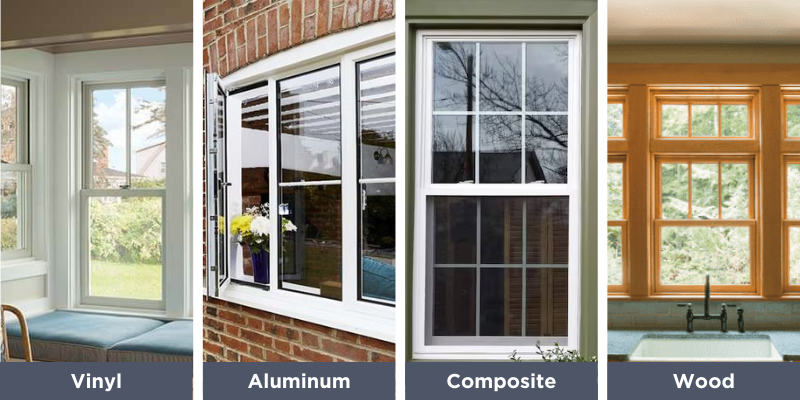
The material of your window plays a major role in determining the cost:
- Vinyl: Vinyl windows are the most common due to their durability, affordability, and energy-efficiency. Their ranges vary significantly, as not all vinyl is created equal.
-
- A window made out of recycled vinyl will cost lower than a window made out of virgin vinyl. It’s important to understand what type of vinyl is used during the manufacturing process to know the quality of the product you will put in your home.
-
- Recycled vinyl is known to degrade over time, by cracking, warping and breaking. Virgin vinyl is more durable and holds up over time with minimal wear and tear with regular maintenance.
-
- A window made out of recycled vinyl will cost lower than a window made out of virgin vinyl. It’s important to understand what type of vinyl is used during the manufacturing process to know the quality of the product you will put in your home.
-
- Aluminum: Aluminum windows are a strong, lightweight metal that are a good option for thin frames. One of the major pitfalls of aluminum windows is that they are not that energy-efficient and are prone to rust and corrosion.
-
- Aluminum has a high U-value, which is the rate of heat transfer through a material.
-
- Windows with low U-values are energy-efficient because they keep your heat inside the home while windows with a high U-value, like aluminum, may not be the best selection for homes located in areas with colder climates, like New England.
- It can be easy to spot their high U-value as aluminum windows are prone to condensation, which can lead to corrosion of the metal over time.
-
- Aluminum has a high U-value, which is the rate of heat transfer through a material.
-
- Composite: Composite frames blend wood fibers and polymers, making them low-maintenance and energy-efficient. They come with a much higher price tag and can cost more than vinyl or aluminum windows.
-
- One of the common pitfalls of composite windows are their weight. Due to their design, they normally require sturdy frames that can withstand the weight and use of the window over time.
- While composite windows are a great option, they may not be as widely available and can have a longer turn around time due to their limited availability.
-
- Wood: Known for their aesthetic appeal, wood windows can cost higher than other materials like vinyl, aluminum, or steel. Wood windows can last a lifetime, as long as they are properly sealed and maintained. Without the proper maintenance, wood can be susceptible to warping, rotting, swelling, cracking, and insect or termite damage.
-
- Weather and moisture conditions where you live determine the amount of maintenance needed. In areas with large temperature differences, like New England, touch-ups and improvements can be needed every couple of years.
- Wood windows may need more maintenance than other materials, but are known to perform better than aluminum windows when it comes to energy-efficiency.
-
Window Replacement Cost by Type and Size
Window type refers to the design of the window. While the majority of homes in New England have double-hung windows, you may have more rare window types or are looking to make a design change.
Different window types come with varying price tags:
- Double-Hung Windows: These traditional windows are practical and affordable, and can be purchased from box stores or contractors from a variety of nationally known manufacturers.
- Casement and Awning Windows: Offering better ventilation and aesthetics, these windows aren’t as common for the whole home but are seen often in homes throughout the region. Because this type of window has a handle and crank mechanism, these windows require routine maintenance to ensure functionality.
- Bay, Bow and Picture Windows: Larger and more luxurious, these windows can vary widely in cost depending on size, complexity of installation and more.
To see what other homeowners have done in your area, visit our Window Transformations Page.
Whole-House Window Replacement Costs
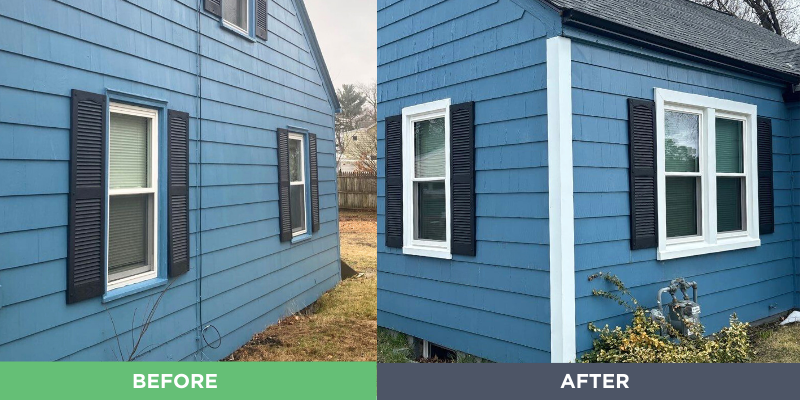
If your budget allows, purchasing all of your windows at once is more cost-effective than a couple at a time.
For a whole-house window replacement, typically 15–20 windows, costs can range from $15,000 to $45,000 installed. There are multiple advantages when you choose to replace your whole house’s windows, but the main advantage is affordability.
Many contractors offer bulk pricing which is a huge benefit of replacing multiple windows at once.
By avoiding multiple small projects, you also avoid paying for multiple permits (if your county requires them) and avoid paying installation costs for multiple individual projects. Think about buying a 2-pack of paper towels, the price per roll is much higher in a 2-pack than a 24-pack, there’s more bang for your buck when you purchase all your windows at once, rather than 2-4 at a time.
Cost by Energy Efficiency and Glass Type
Energy-efficient windows often come at a higher price but provide long-term savings:
- Double-Pane Windows: The standard for most homes, offering good insulation at a reasonable cost.
- Triple-Pane Windows: These provide maximum insulation and are ideal for cold climates, though they cost about 20–30% more than double-pane windows.
- Tempered Glass: This glass offers better protection by blocking debris damage caused by inclement weather or exposure.
For more information about energy-efficiency in windows, visit our article about U-Factor vs. R-Value. For more information regarding federal tax credits available for energy efficient upgrades, click here.
Factors That Determine Window Replacement Costs
Several factors affect overall window replacement costs:
- Labor: Professional installation prices vary, but as a general rule of thumb labor accounts for approximately 1/3 of the price of the project.
- Location: Prices may vary depending on your region, with urban areas often having higher labor costs due to a higher cost of living.
- Customization: Custom-sized or uniquely shaped windows will generally increase the total cost of window replacements.
Additional Costs and Considerations
Be aware of these potential additional expenses:
- Permits: Some areas require permits for window replacement, which can add to your overall costs.
- Disposal Fees: Removing old windows may cost an additional $50 to $100 per window.
- Custom Capping: Many window replacement companies do not include custom capping. If they do, their services are often seen as quick and for aesthetic purposes only. At Yankee Home, we always include custom capping during our window replacement process as its a long-term solution that helps water proof the area and is intricately completed for each window.
How to Know If You Need Replacement Windows
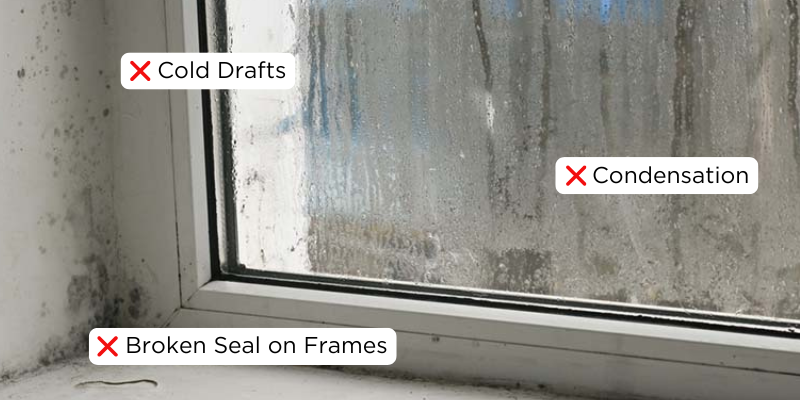
Signs that it’s time to replace your windows include:
- Drafts or leaks
- Visible damage such as warping or cracked frames
- Condensation and moisture build up
- Broken glass panes
- Increased energy bills from inefficient insulation
- Missing coil trim
DIY vs. Professional Installation
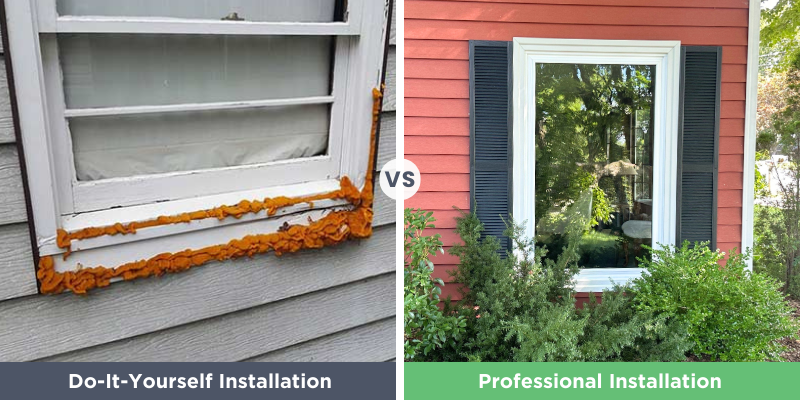
While some homeowners may choose to install their windows themselves to save money, improper installation can lead to long-term problems.
Hiring a professional ensures optimal window performance and can prevent issues like drafts, leaks, and reduced energy efficiency.
How Much Are Replacement Windows?
The cheapest window isn’t always the best option when it comes to replacing your windows.
Window replacement is a worthwhile investment in your home’s comfort, energy efficiency, and resale value. Understanding the cost factors and available options can help you make the best decision for your needs. Keep these points in mind when asking yourself, “How much are replacement windows?”.
If you’re ready to talk about getting your window project started, contact Yankee Home today for a FREE estimate.

